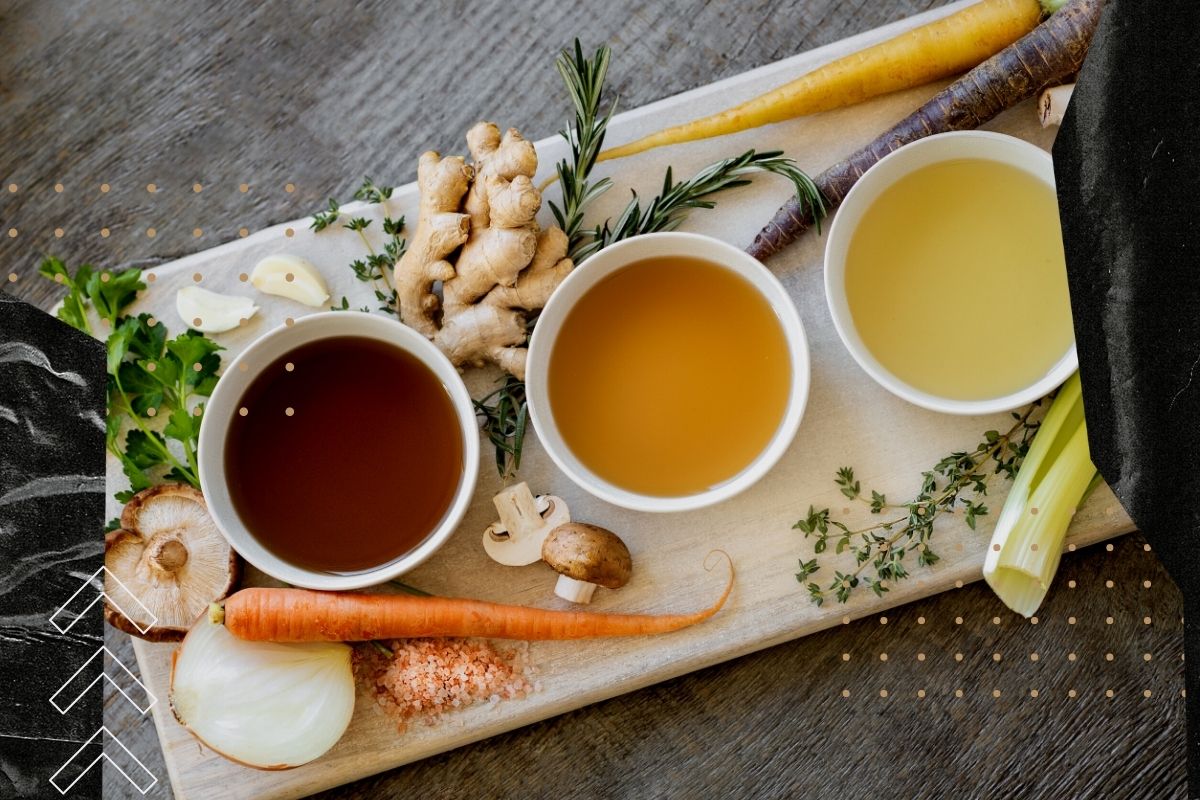Bone broth is one of the many foods that can support your Intermittent Fasting efforts, as it helps keep you satiated with minimal calories and contains high amounts of protein and other nutrients. However, there are a few things you should know before implementing bone broth into an IF eating plan.
What is bone broth?
Bone broth is a nutrient-dense liquid made from simmering the bones and connective tissues from animals, such as chicken, beef, and fish, in water. It’s been used as a healing tonic for centuries and has become increasingly popular in recent years for its multiple health benefits.
Bone broth is rich in collagen, minerals, amino acids like glutamine, and a wide variety of vitamins and minerals. It also contains electrolytes, such as calcium, magnesium, potassium, and phosphorous, which are essential for hydration, energy production, and muscle function.
Will drinking bone broth break your fast?
Although bone broth is packed with vitamins, minerals, and amino acids, it doesn’t contain any calories. Therefore, drinking bone broth won’t break your fast. The majority of diets, including intermittent fasting, involve eating foods that are low in calories and rich in nutrients.
Other than the amount of calories in your drink, there are no other differences between the two. The reason why bone broth is recommended for those who practice intermittent fasting is because it fills you up with a high amount of proteins and other nutrients essential for muscle repair, energy production, and proper hydration. In other words, bone broth is a meal replacement that keeps you satisfied throughout the day with minimal calories.
How to make bone broth while fasting
First, you’ll need to acquire bones that are rich in collagen, such as chicken or fish bones. Next, bring the bones to a boil in a large stockpot filled with filtered water.
Once the water is boiling, reduce the heat and simmer the bones for a few hours (anywhere from 1-10 hours, depending on the desired taste and nutrients). Once the broth is done cooking, strain it and let it sit in the refrigerator for a few hours before consuming.
As you can see, making bone broth while fasting is relatively simple, but it does take a decent amount of time. However, you can speed up the process by using a pressure cooker or using a slow cooker.
Tips for consuming bone broth while intermittent fasting
It’s recommended that you drink bone broth as a meal replacement during the day instead of as a meal with other foods. However, if you want to add it to a meal or consume it during a fasted state, you can add it to soups or stews as a thickening agent or use it as a stock in a recipe.
It’s important to note that you may need to adjust the amount of bone broth you consume depending on your goals. If you’re aiming to lose weight, drink less bone broth, and if you’re trying to gain weight, drink more.
Why is Bone Broth Good for Intermittent Fasting?
Although it may seem like a difficult task to incorporate new foods into your diet while trying to maintain your eating plan, bone broth is an excellent food to start with. It’s rich in vitamins, minerals, and proteins that are beneficial for your health, and it can help keep you feeling full for longer periods of time.
There are many health benefits associated with intermittent fasting, such as increased energy and metabolism, improved mental health, and better sleep. It can also help prevent diseases, such as type 2 diabetes, heart disease, and certain cancers.
Choosing the right foods to support your IF efforts is essential to achieving its benefits while avoiding the side effects of malnutrition. While many people see intermittent fasting as a way to lose weight, it can be used to achieve many other health goals, such as improving mental health, lowering blood pressure, and improving sleep.
Conclusion
While there are many benefits associated with intermittent fasting, there are also a few drawbacks, such as difficulty staying hydrated, increased levels of cortisol, and difficulty exercising during fasting hours.
Fortunately, bone broth is a great food to help address these issues. It’s rich in minerals, such as calcium and magnesium, that are essential for hydration. It also contains high amounts of proteins that help increase satiety and assist with muscle repair after physical activity.
In conclusion, bone broth can be used as a meal replacement while fasting. It’s rich in nutrients, such as proteins, minerals, and vitamins, that keep you full and hydrated. It also provides many health benefits, such as improved metabolism, better mental health, and better sleep, which is essential for overall health and wellness.





